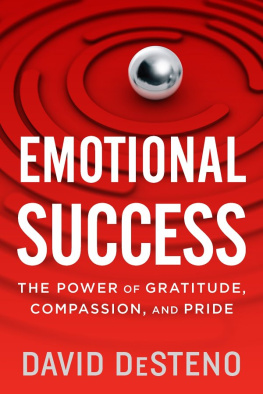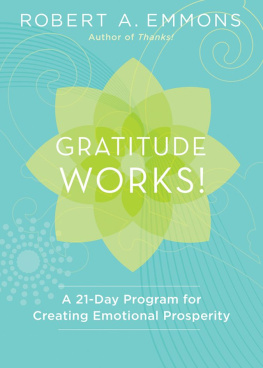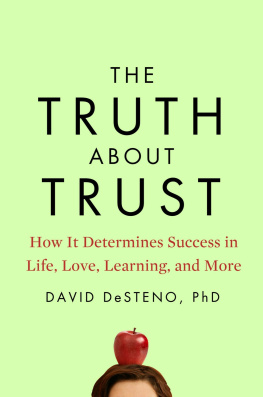DeSteno - Emotional success: the power of gratitude, compassion, and pride
Here you can read online DeSteno - Emotional success: the power of gratitude, compassion, and pride full text of the book (entire story) in english for free. Download pdf and epub, get meaning, cover and reviews about this ebook. City: Boston;New York, year: 2018, publisher: Houghton Mifflin Harcourt, genre: Politics. Description of the work, (preface) as well as reviews are available. Best literature library LitArk.com created for fans of good reading and offers a wide selection of genres:
Romance novel
Science fiction
Adventure
Detective
Science
History
Home and family
Prose
Art
Politics
Computer
Non-fiction
Religion
Business
Children
Humor
Choose a favorite category and find really read worthwhile books. Enjoy immersion in the world of imagination, feel the emotions of the characters or learn something new for yourself, make an fascinating discovery.
Emotional success: the power of gratitude, compassion, and pride: summary, description and annotation
We offer to read an annotation, description, summary or preface (depends on what the author of the book "Emotional success: the power of gratitude, compassion, and pride" wrote himself). If you haven't found the necessary information about the book — write in the comments, we will try to find it.
DeSteno: author's other books
Who wrote Emotional success: the power of gratitude, compassion, and pride? Find out the surname, the name of the author of the book and a list of all author's works by series.
Emotional success: the power of gratitude, compassion, and pride — read online for free the complete book (whole text) full work
Below is the text of the book, divided by pages. System saving the place of the last page read, allows you to conveniently read the book "Emotional success: the power of gratitude, compassion, and pride" online for free, without having to search again every time where you left off. Put a bookmark, and you can go to the page where you finished reading at any time.
Font size:
Interval:
Bookmark:
Copyright 2018 by David DeSteno
All rights reserved
For information about permission to reproduce selections from this book, write to trade.permissions@hmhco.com or to Permissions, Houghton Mifflin Harcourt Publishing Company, 3 Park Avenue, 19th Floor, New York, New York 10016.
www.hmhco.com
Library of Congress Cataloging-in-Publication Data is available.
ISBN 978-0-544-70310-0
Cover design by Michaela Sullivan
Cover photographs Getty Images
Author photograph Andr Mehta
e ISBN 978-0-544-70312-4
v1.1217
To my family
Me want cookie... but me wait. For almost anyone who was or lived with a child sometime in the past forty years, the first part of that sentence calls up images of a blue, fuzzy, grammatically challenged, adorably gluttonous Muppet: Cookie Monster. But the second part caught me off guard when I first heard it. Cookie, as his name implies, was traditionally an embodiment of immediate gratification. Sure, once in a while he was tweaked to accommodate the concerns of the time. When the healthiness of kids diets was in question, Cookies penchant for sweets was changed to include fruit. When the dangers of food allergies in schools became apparent, he made sure his cookies were nut-free. Yet across the years, one trait remained constant: impulsivity. When Cookie wanted something, he wanted it now. But in 2013, during Sesame Streets forty-fourth season, that changed; but me wait became part of Cookies Muppet mantra and, as a result, part of a new generations early education.
This change is evidence of our societys continuing obsession with success. And when it comes to achieving that success, whether its at the office, in managing finances, in bettering health, or even in pursuing an unlikely dream, decades of research has revealed that self-control is key. By that, I mean the ability to resist urges for immediate gratification in order to obtain greater rewards in the future.
Best-selling books such as Willpower,How Children Succeed, and Grit all promise insight into how perseverance and patience can affect our lives for the better. Not to be outdone, magazines from the Atlantic to People routinely feature articles on the benefits of self-control and how to obtain it.
I dont mean to criticize this emphasis on self-control and valuing the future. To the contrary, I think we need it. And while the idea of self-controls benefits isnt newwe can see it extolled in moral tales and treatises going back for centurieswhat is new is that this idea has moved from philosophy and theology into empirical proof. The benefits of self-control arent a matter of opinion anymore; theyre quantifiable. And what can be quantified can, in theory, be maximized. The million-dollar question, of course, is How? How can self-control be enhanced?
Its here that I fear we have gone astray. For almost fifty years weve been developing science-based strategies meant to help us reach our goals. Yet on average, we are no better at delaying immediate gratification than we were in the 1960s. If anything, our impatience and desire for immediate satisfaction are on the rise. As individuals and as a society, were spending more on impulse buys and conveniences rather than saving for a rainy day or retirement. Were diverting our attention to games or social media on our smartphones rather than focusing it on learning and honing skills we need. Were satisfying our sweet tooth and, as a result, expanding our waists simply to gain momentary pleasures at a great cost to our future well-being. And at a more macro level, many of us are resisting choices such as spending a bit more for clean or renewable energy that, though somewhat costlier in the moment, will help avoid greater problems down the road. In short, were planning less for the future, not caring as much about what that future will bring. And while its undoubtedly true that each of these examples of impatience and shortsightedness stems from many factors, underlying them all is a growing bias toward pleasure in the moment.
On any given day, most people fail to stick with their daily goals about 20 percent of the timea percentage that climbs quickly if theyre busy, tired, or stressed. That means almost one out of every five times we try to work harder, eat better, save more, or prepare for a test or performance evaluation, were going to fail to do it in favor of something else thats more fun in the moment. And when decisions involve important goalsthe ones that truly matter to peoplethe success rate is even worse. Only 8 percent of New Years resolutions are kept throughout the year. While 25 percent fail in the first week. The result is that most of us frequently end up feeling powerless to stick to our goals and, even worse, upset with ourselves for loafing, splurging, bingeing, or otherwise giving in to a desire for some short-term pleasure that will ultimately cost us.
This raises an intriguing and troubling question: If delaying gratification and valuing the future are so important, and if weve been using science-backed strategies for decades to help us do it, why are most of us still so bad at it? One would think that our minds would come equipped with tools to meet the challenges posed by a lack of impulse control. After all, thats one hallmark of evolutionary development: the mind and body retain features that help us to thrive. So, either the development of the human mind has a gaping hole, as the need for self-control has been around since our speciess beginning, or were doing something wrong. And as a scientist who for decades has studied how humans make decisions, I can confirm that its the latter.
Our minds do come equipped with the necessary tools to succeed, but were forsaking them. We still have serious problems delaying gratification, developing dedication, and cultivating perseverance because our notion of how self-control works is flawed. Put simply, were seeing only half the picture. When were forced to choose strategies for success, we tend to favor cognitive onesstoic approaches characterized by reason, deliberation, and force of will. If you read those bestsellers I mentioned, page through popular magazines, or even peruse scientific papers, youll find the same underlying message: rationality trumps emotion. To stand firm in the face of challenges and temptations, were told to use what psychologists term executive functionthat part of the mind that manages and controls subordinate processes such as memory, attention, and feelings. The term executive wasnt picked by accident. This aspect of the mind is, in essence, the boss; it gives the orders that the rest of the mind is supposed to follow. Executive function allows people to plan, to reason, and to use willpower to keep focused, accept sacrifices, and ignore or suppress emotional responses that might get in the way of reaching their long-term aspirations. And cognitive strategies such as theseones based on reason and analysis as opposed to emotionsare believed to maintain the perseverance required to succeed.
But the fact that a given set of tools sometimes works doesnt imply that it will always work. Nor does it imply that theyre the best tools for the job. In the case of our reliance on cognitive tools such as willpower, I believe weve created a predicament. Weve ended up with a set of tools that, while effective at times, is inefficient and fragile. More troubling, under certain circumstances these tools can even be harmful. The upshot of using them is that were often setting ourselves up for failure while increasing the likelihood of damage to our physical and mental well-being over the long run.
Next pageFont size:
Interval:
Bookmark:
Similar books «Emotional success: the power of gratitude, compassion, and pride»
Look at similar books to Emotional success: the power of gratitude, compassion, and pride. We have selected literature similar in name and meaning in the hope of providing readers with more options to find new, interesting, not yet read works.
Discussion, reviews of the book Emotional success: the power of gratitude, compassion, and pride and just readers' own opinions. Leave your comments, write what you think about the work, its meaning or the main characters. Specify what exactly you liked and what you didn't like, and why you think so.











